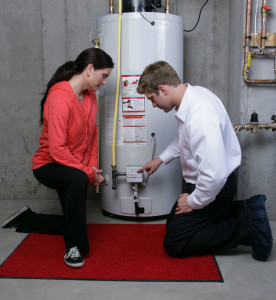Water Heater’s Don’t Get a Break in the Summer!
Water heater maintenance is not something homeowners should ignore. It shouldn’t be last on your list of to-do’s this summer – not if you want to continue to enjoy warm morning showers, washing dishes and clothes and getting hands clean. You need hot water year round, so you can’t give your water heater maintenance a break in the summer. An annual inspection is a must to avoid water heater problems, so be sure to get it on the calendar soon.
Here’s what a plumber will do during the checkup:
- Check for corrosion. When the water heater starts to corrode, danger ensues. Because water heaters are pressurized compartments, any damage to the sealed unit can lead to an explosion. So can worn out gas connections or electrical components.
- Assess its safety. While checking for corrosion, the plumber will also ensure the system’s overall safety, looking for combustion problems, compromised gas connections and so forth.
- Test the TPR valve. The temperature and pressure relief valve plays a critical role in its safety and performance. The plumber will test the valve to ensure that the system is operating correctly.
- Evaluate the sacrificial anode. This device rests inside the tank and is specifically designed to attract rust, preventing the rust from attaching to the tank’s surfaces. The plumber will need to drain some water from the tank to assess the anode. If it’s rusted, the plumber will install a new one.
- Drain the tank. This is an important step that should generally be performed once a year. The plumber will drain all of the water from the tank. At this point, he can access the bottom of the tank with a special brush, removing mineral buildup and debris. Then, he will continue to fill up the tank with water and flushing the system, until the water runs clear. Ask the plumber to show you how to drain the tank throughout the year, using a garden hose and a bucket. Draining about a quarter of the tank every few months helps keep the system of debris.
- Check the temperature setting. For optimal water savings, the plumber should set the unit’s temperature to 120 degrees. If your system was set at 140 degrees, which is the typically manufacturer setting, you can save approximately 5 percent on energy costs for every 10 degrees to which you lower the setting.
Why not schedule water heater maintenance today? Make sure the system can last throughout the summer so you can depend on it to supply you with hot water whenever you need it. Call (281) 351-6661 or contact us online for a water heater inspection or to discuss your options for an affordable and dependable water heater professionally installed anywhere in the Houston area (1960, Spring, The Woodlands, Cypress, Tomball, Magnolia) by a licensed Daniels Plumbing professional.

